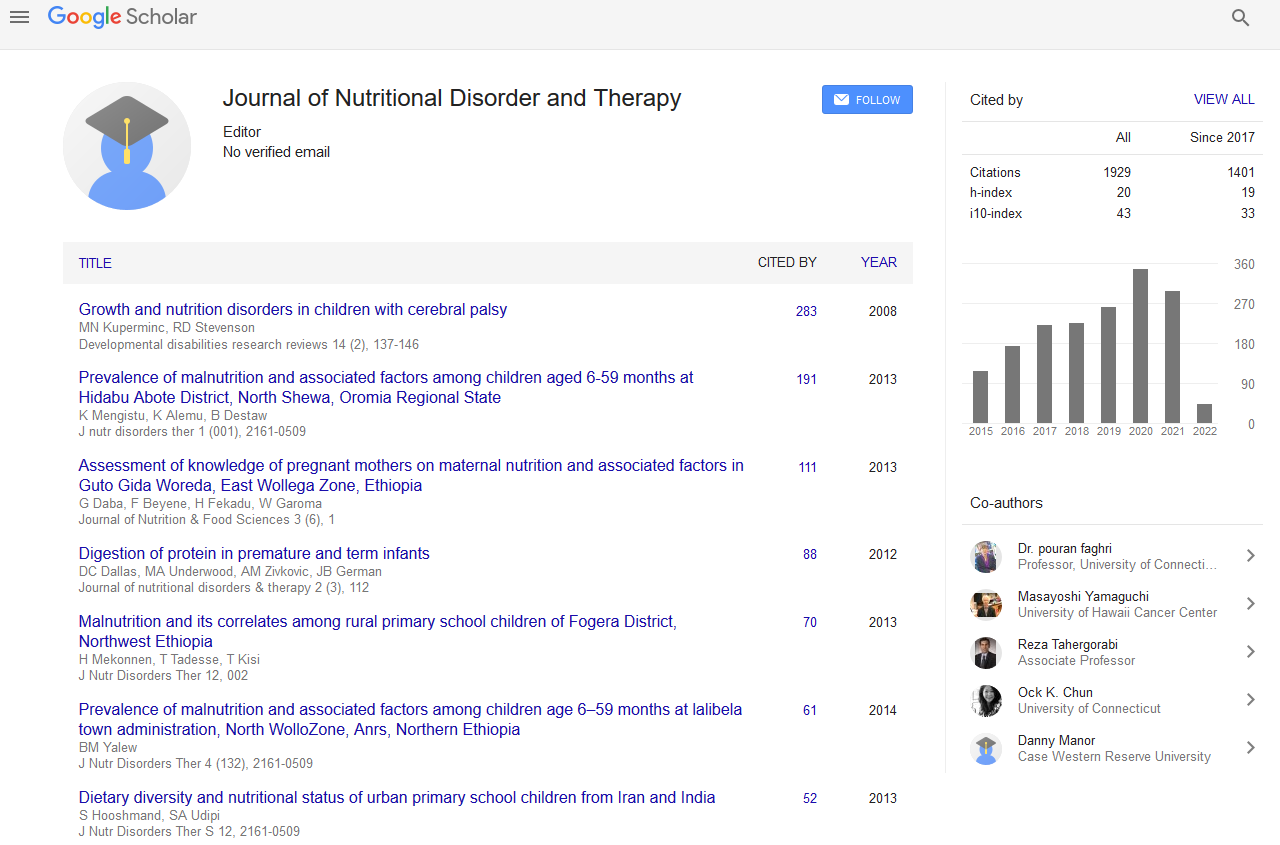Indexed In
- Open J Gate
- Genamics JournalSeek
- Academic Keys
- JournalTOCs
- Ulrich's Periodicals Directory
- RefSeek
- Hamdard University
- EBSCO A-Z
- OCLC- WorldCat
- Publons
- Geneva Foundation for Medical Education and Research
- Euro Pub
Useful Links
Share This Page
Journal Flyer

Open Access Journals
- Agri and Aquaculture
- Biochemistry
- Bioinformatics & Systems Biology
- Business & Management
- Chemistry
- Clinical Sciences
- Engineering
- Food & Nutrition
- General Science
- Genetics & Molecular Biology
- Immunology & Microbiology
- Medical Sciences
- Neuroscience & Psychology
- Nursing & Health Care
- Pharmaceutical Sciences
Potential pharmaceutical applications of Omega-3 oil derived from marine mammals
JOINT EVENT: 13th International Congress on Advances in Natural Medicines Nutraceuticals & Neurocognition & 14th International Conference on Clinical Nutrition
July 27-29, 2017 Rome, Italy
Hu Liu and Lili Wang
Memorial University of Newfoundland, Canada
Scientific Tracks Abstracts: J Nutr Disorders Ther
Abstract:
As the Inuit people spread across the Arctic and Greenland, they ate a lot of fatty meat from seals, whales and fish. However, the Inuit didn�??t have a lot of heart attacks. In the 1970s, Danish scientists studying Inuit diets proposed that �?-3 fatty acids were cardio-protective. In the North Atlantic Ocean between Greenland and Eastern Canada, there are over 10 million Harp seals. Each year about 200,000 seals are harvested to maintain the balance of ecosystem. It is believed that Harp seal oil is the best source of �?-3 lipids and has several superior characteristics over fish oil. It contains all cis-docosahexaenoic acid (DHA, 22:6 �?-3), eicosapentaenoic acid (EPA, 20:5 �?-3) and docosapentaenoic acid (DPA, 22:5 �?-3), while fish oil contains only EPA and DHA. It is found that �?-3 fatty acids in seal oil are mostly esterified at the triacylglyceride sn-1,3 (outer) positions, which makes them the preferred substrates for human lipases. Fish are aquatic vertebrates that are typically cold-blooded and are described as non-tetrapod chordates. �?-3 fatty acids in fish oil are distributed mainly at the sn-2 position of triacyglycerides. Such a positional distribution of �?-3 fatty acids in the glycerol backbone makes them poor substrates for human lipases which normally hydrolyze fatty acylglycerol ester bonds at the sn-1 and sn-3 positions of triacylglycerides. In addition seal oil is extracted and processed at low temperatures (20-50°C), resulting in very little oxidation and formation of trans-fatty acids. On the other hand, fish oil is extracted by steam (100°C) which results in significantly elevated levels of both oxidized- and translipids. We hypothesized that seal oil emulsions can be used in the total parenteral nutrition (TPN) regiments for hospitalized patients who require intravenous infusion of nutrients, especially post-surgical patients, patients experiencing early stage of sepsis/systematic inflammatory response syndrome (SIRS), patients with inflammatory bowel diseases (IBD), and patients with autoimmune diseases. A study using an endotoxemia rat model (to mimic septic conditions) demonstrated the potent anti-inflammatory effects of seal oil.
Biography :
Hu Liu, Ph.D., School of Pharmacy, Memorial University of Newfoundland, ST. John's, NL, CANADA Following his B.Sc. (Pharmacy) in 1982 from Beijing Medical College and M.Sc. (Pharmaceutical chemistry) degrees from Beijing Medical University (now Peking University) in Beijing, China, Dr. Liu obtained his Ph.D. degree in lipid and lipoprotein biochemistry from the University of Alberta in 1993 in Canada. He then did his post-doctoral training in pharmacology and medicinal chemistry at the University of Michigan, Ann Arbor MI, USA. In 1994, Dr. Liu joined School of Pharmacy, Memorial University, and he is a full professor. From 1999 to 2004, Dr. Liu was a recipient of the Career Award in Health Sciences sponsored by Medical Research Council of Canada (MRC) which was renamed as Canadian Institutes of Health Research (CIHR) and the Health Sciences Foundation of Canada's Research Based Pharmaceutical Companies (Rx&D-HRF). In 2000, he was awarded with the AstraZeneca New Investigator Research Award by the Association of Faculties of Pharmacy of Canada (AFPC). He served as an internal grants reviewer for the Pharmaceutical Sciences Committee of CIHR. In 2002, together with three colleagues Dr. Liu founded the former North Atlantic BioPharma Inc., a biotech company focused on developing marine based pharmaceuticals. Dr. Liu was the President and Chief Scientific Officer of the company. His research activities were funded by many agencies including MRC/CIHR, Banting Foundation, National Research Council of Canada (NRC), Atlantic Canada Opportunities Agency (ACOA) and International Science and Technology Partnership Canada (ISTPCanada). Dr. Liu's research interests include: development of drugs and drug delivery systems in the areas of cancer, cardiovascular disease and inflammation in addition to cold ocean derived pharmaceuticals.


